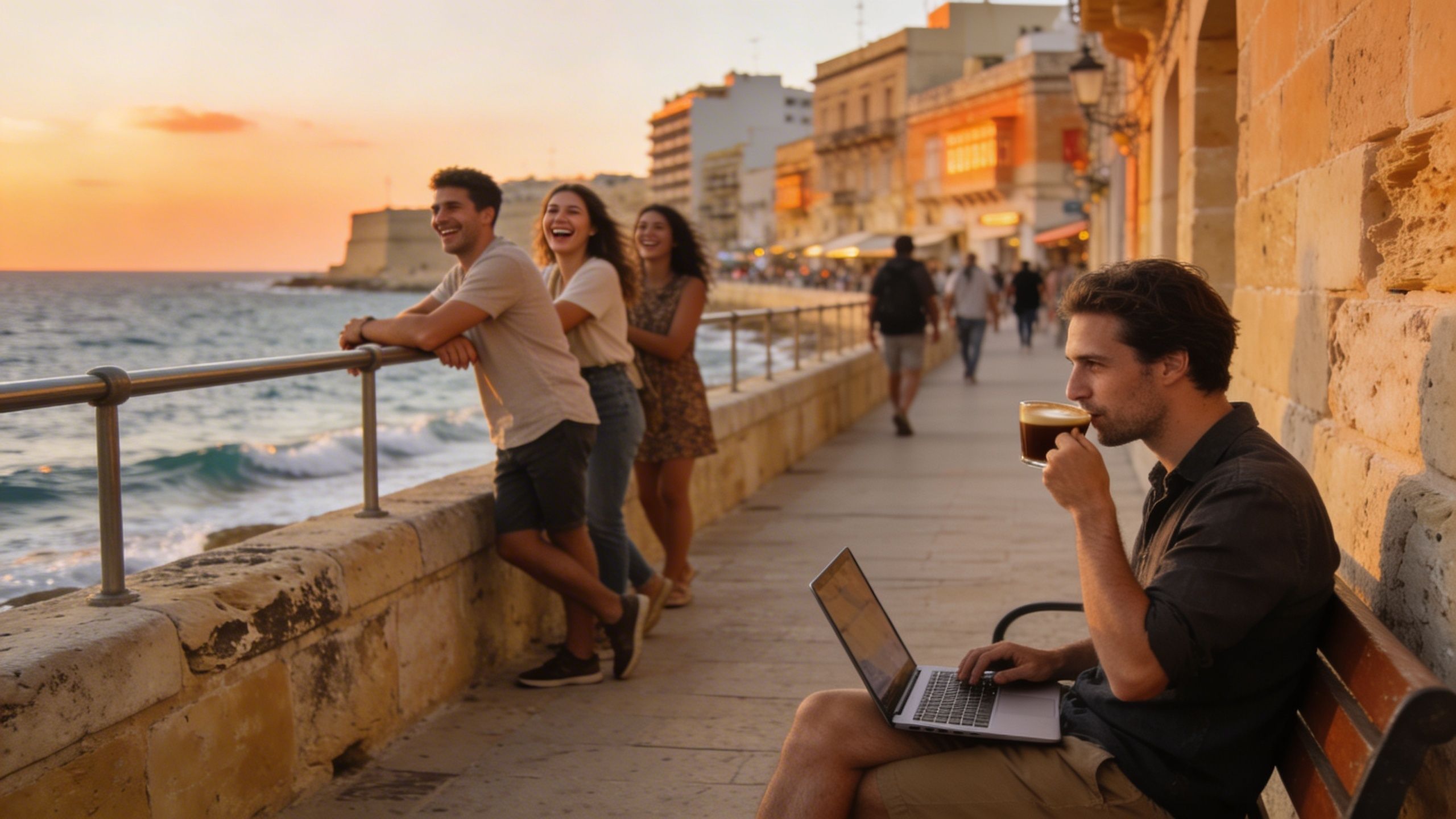Malta: Nomad Visas, Market Myths & Where to Buy
Malta blends café culture, sea‑air weekends and nomad visas — but buyers must match lifestyle needs (fiber, terraces, community) with market realities and residency rules.
Imagine stepping out of a tramonto‑washed Valletta alley, espresso in hand, then walking 12 minutes to a coworking rooftop where a sea breeze keeps your laptop cool. Malta is small enough for weekends that feel like mini‑holidays and big enough to sustain a thriving digital‑nomad scene — but the property story here isn't all postcard views.
Living the Malta lifestyle

Daily life in Malta is sunlit and social. Mornings mean coffee at Sliema promenades, afternoons are for swimming at Għajn Tuffieħa or cliffside walks near Dingli, and evenings move to buzzy piazzas in St Julian’s. English is an official language, so settling in feels quicker — and yes, the Nomad Residence Permit exists for remote workers who want to make days like this a habit rather than a holiday.
Neighborhood spotlight — Valletta, Sliema, and Marsaxlokk
Valletta is theatrical: Baroque facades, narrow streets and an unbeatable culture calendar. Sliema and St Julian’s trade old‑town intimacy for cafes, coworking spots and sea‑front walks — they’re where nomads cluster. For the quieter, salt‑air life, Marsaxlokk’s fishing‑village lanes and Sunday market feel like living in a postcard, with fresh fish, pastel boats and slower afternoons.
Food, markets and the weekend rhythm
Picture lunch at Nenu the Artisan Baker, plates of ftira for weekend beach picnics, and evenings at small wine bars tasting Ġellewża. Markets like Marsaxlokk Fish Market and the Valletta farmers’ stalls shape weekends; seasonal festas fill summer nights with fireworks and band clubs serving rabbit stews. These rhythms shape what you want in a home: an easy kitchen, a balcony for aperitifs and a short walk to community life.
- Lifestyle highlights to look for in a Malta home
- Fast fiber or reliable 4G coverage (check street speed tests)
- Balcony or roof terrace for outdoor working and evening gatherings
- Walkability to cafes, ferries or buses — especially in Sliema/Valletta
- Proximity to weekly markets or a local community hub
Making the move: practical considerations

The dream of sipping sea‑view espresso meets some concrete realities: Malta’s market has been rising (official RPPI data shows mid‑single digit annual increases in recent quarters), and pockets of tourist‑oriented stock can be pricier than inland neighbourhoods. That said, the island’s scale means tradeoffs are clearer — you can often trade a tiny sea‑view for better workspace and community links nearby.
Property styles and how they shape life
Traditional townhouses with solid limestone walls keep cool in summer but often need retrofitting for insulation and wiring. Modern apartments near Sliema and St Julian’s offer turnkey amenities and fiber — great for nomads who need a ready workspace. If you crave outdoor life, look for maisonettes with a private terrace or roof access; they’re the practical equivalent of owning a tiny holiday every day.
Working with local experts who get the nomad life
Pick an agency that speaks remote‑work needs: ask about internet speeds per block, proximity to coworking spaces, short‑term rental flexibility and familiarity with Nomad Residence Permit paperwork. Since April 2024, new Nomad applicants face a higher income threshold (€42,000), so agencies who guide you through lease evidence for visa applications and police‑clearance timing become invaluable.
- Practical move steps that blend work and lifestyle
- List short neighborhoods you love and test 1‑week stays in each before bidding.
- Confirm fiber or 4G speeds at exact property addresses with an ISP or agency.
- Secure a rental agreement that can double as Nomad Permit evidence, then apply for residency.
- Work with an agent to check Title and occupancy history — avoid units used mostly for short‑term lets if you want community.
Insider knowledge: myths, red flags and local reality
There are a few myths that trip up buyers. Myth: "Buy a golden‑visa property and call it a day." Reality: investor citizenship programmes have faced EU legal and political backlash, and many buyers ended up owning empty ‘investment’ flats that never integrated into local life. If your aim is community and daily convenience, avoid properties marketed primarily as passport vehicles.
Cultural integration and practical social tips
Malta’s social scene values local rhythms: weekends are for festas and family dinners; shops close for a siesta‑like pause on some afternoons. Learn simple Maltese phrases (and use English liberally), join a local Church festa or a coworking meet‑up to quickly become part of the neighbourhood circuit. These small moves turn an apartment into a home faster than any renovation.
Long‑term thinking — what grows well here
Malta’s compact size means neighbourhood reputations can shift quickly. Areas with better transport links, coworking and consistent community activities tend to hold value. Official indices show steady price growth in recent years, so think lifestyle first and liquidity second: buy where you want to live, and where renters or buyers who value community could find the property appealing later.
Conclusion — live the rhythm, then buy the place that fits it. Start by short stays in Valletta, Sliema and a coastal village, test your work setup, and use an agency that measures internet and community as seriously as square metres. That sequence protects your lifestyle and lets the property support the life you came for.
Norwegian who has helped 200+ families relocate from Oslo to Spain; expert in relocation services and community integration.


